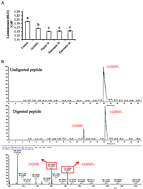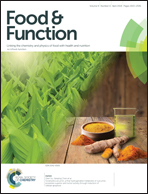Evaluating the effects of IADHFL on inhibiting DPP-IV activity and expression in Caco-2 cells and contributing to the amount of insulin released from INS-1 cells in vitro†
Abstract
Dipeptidyl peptidase-IV (DPP-IV) is a serine exo-peptidase that can inactivate incretins by removing N-terminal dipeptides. Currently, inhibiting the DPP-IV activity is a common treatment for type 2 diabetes (T2D). The goal of this study is to investigate whether IADHFL, a novel DPP-IV inhibitory peptide identified from bighead carp (Hypophthalmichthys nobilis), has the potential to modulate T2D. IADHFL remained stable after simulated gastrointestinal digestion and significantly decreased the activity and expression of both soluble and membrane-bound DPP-IV after 24 h and 48 h of treatment. Intact peptide absorption was observed, but a percentage of the peptide was degraded while passing through a monolayer of Caco-2 cells. In addition, a double-layered cell model showed that the peptide could increase insulin secretion from INS-1 cells after glucose treatments of 2.8 mM and 16.7 mM. Finally, IADHFL could regulate the expression levels of genes associated with insulin secretion and T2D in INS-1 cells.



 Please wait while we load your content...
Please wait while we load your content...